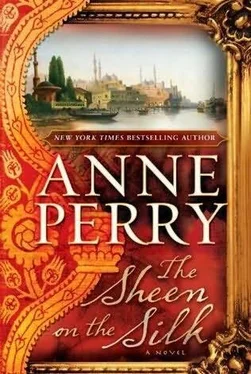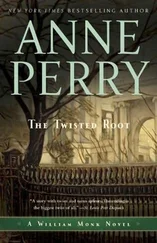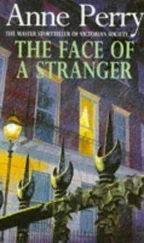She gave him a tiny portion of her precious Theban opium. Sometimes she mixed it with other herbs such as henbane, hellebore, aconite, mandragora, or even lettuce seed, but she did not wish him to fall into unconsciousness, so she kept it pure.
Basil returned regularly, and if she had no other patients, he often remained for a little while and they talked. He was an intelligent man of obvious education, and she found him interesting and likable. But beyond that, Anna hoped to learn something from him.
She broached the subject at the beginning of the second week of his treatment.
“Oh yes, I knew Bessarion Comnenos,” he said with a slight shrug. “He cared very much about this proposed union with the Church of Rome. Like everyone else, he hated the thought of the pope taking precedence over the patriarch here in Constantinople. Apart from the insult and our loss of self-governance, it is so impractical. Any appeal for permission, advice, or relief would take six weeks to get to the Vatican, however long it required for the matter to reach the pope’s attention, and then another six weeks to get back. By that time it could be too late.”
“Of course,” she agreed. “And there is the question of money. We can ill afford to send our tithes and offerings to Rome.”
He groaned so sharply that for a moment she was afraid his pain was physical.
He smiled with apology. “We are in our own city again, but we balance on the brink of economic ruin. We need to rebuild, but we cannot afford to. Half our trade has gone to the Arabs, and now that Venice has robbed us blind of our holy relics, the pilgrims scarcely bother with us anymore.”
They sat in the kitchen. She had made an herbal infusion of mint and camomile, and they were sipping it because it was still hot.
“Added to which,” he went on, “there is the major issue of the filioque clause, which is the real sticking point. Rome teaches that the Holy Spirit proceeds from both the Father and the Son, making them both equally God. We believe passionately that there is only one God, the Father, and to say otherwise is blasphemy. We cannot condone that!”
“And Bessarion was against it?” she asked, although it was barely a question. Why would anyone think Justinian had killed him? It made no sense. He had always been Orthodox.
“Profoundly,” Basil agreed. “Bessarion was a great man. He loved the city and its life. He knew that union with Rome would pollute the true faith and eventually destroy everything we care about.”
“What was he going to do about it?” she said tentatively. “If he had lived…”
Basil shrugged slightly. “I’m not sure that I know. He spoke well, but he did little enough. It was always ‘tomorrow.’ And as you know, tomorrow did not come for him.”
“I heard he was murdered.” She found it difficult to say the words.
Basil looked down at the table and his bony hands holding the cup of mint infusion. “Yes. By Antoninus Kyriakis. He was executed for it.”
“And Justinian Lascaris, too?” she prompted. “Was there a trial?”
He looked up. “Of course. Justinian was sent into exile. The emperor himself presided. It appears Justinian helped Antoninus dispose of the body so it might look like an accident. Actually I imagine they thought it would never be found.”
She swallowed. “How did he do that? How can a body not be found?”
“At sea. Bessarion’s body was discovered tangled in the ropes and nets of Justinian’s boat.”
“But that could have been without his knowledge!” she protested. “Perhaps Antoninus didn’t have a boat, and simply took one!”
“They were close friends,” Basil replied quietly. “Antoninus would not have implicated a man he knew so well when there were any number of other boats he could have taken.”
It made no sense to Anna. “Was Justinian a man to leave evidence like that, condemning himself?” She knew the answer. She would never have made such a mistake, and neither would he. “Are they even sure Antoninus was guilty? Why would he kill Bessarion?”
Basil shook his head. “I have no idea. Perhaps they quarreled; he fell overboard and panicked. It can be difficult trying to help someone who is thrashing around; they become as much a danger to others as they are to themselves.”
Anna had a vision of Justinian losing his temper, striking more forcefully than he had intended. He was strong. Bessarion could have overbalanced. He would flail around in the water and be pulled down, gasping, crying out, drowning. Had Justinian panicked? Not unless he had changed beyond all recognition from the man she had known. He had never been a coward. And if he had intended to kill Bessarion, then he would not have cut the ropes, he would have stayed all night and found the body, then tied weights to it and rowed far out in the Bosphorus and let it sink forever.
She felt a sudden sense of release. It was the first tangible evidence to grasp. She had facts, and even if she could not use them yet, they showed her brother’s innocence irrefutably to her. “It sounds like an accident,” she pointed out.
“It’s possible,” Basil conceded. “Perhaps if it had been anyone else, they would have taken it as such.”
“Why not for Bessarion?”
Basil made a slight gesture of distaste. “Bessarion’s wife, Helena, is very beautiful. Justinian was a handsome man, and while he was religious, he was also imaginative, articulate, and had a dry and sharp sense of humor. He was a widower, and therefore free to follow his inclinations where they led him.”
“I see…” Anna was a widow and held a hollow pain of loss inside her, too, but it was different. Eustathius’s death had been both a guilt and a release. He had been of good family, wealthy, a soldier of courage and skill. His lack of imagination bored her and eventually made her find him repugnant. And he had been brutal. She still felt nausea rise inside her at the memory. The emptiness within seemed as if it would fill her until it burst through her skin. She was incomplete, maybe as much as the eunuch she pretended to be.
“You think that Justinian cared for Helena?” she asked incredulously. “Is that what people are saying?”
“No.” Basil shook his head. “Not really. I should think a quarrel that got out of hand is more likely.”
After he had gone, she examined her herb and general medicine store. She needed more opium. Theban was the best, but it was imported from Egypt and not easily obtained. She might have to settle for second quality. She also needed more black hyoscyamus, mandragora, juice of climbing ivy. She was low in such ordinary herbs as nutmeg, camphor, attar of roses, and a few other of the common remedies.
The following morning, she set out to find a Jewish herbalist whose name she had heard recommended. Like all Jews, he lived across the Golden Horn in district thirteen, Galata. She took as much money as she could afford to spend and set out for the shore. Since having Basil as a patient, she was much better off than previously.
It was hot already, even this early in the day. It was not a long walk, and she enjoyed the sound and bustle as people unloaded donkeys from the day’s trade. There was a pleasant smell of baking in the air and the salt breath up from the water.
At the harbor, she waited until there was a taxi going across to Galata that she could share, and fifteen minutes later she was on the northern shore. Here it was even more run-down than the main city. Houses were in need of repair, windows were paned haphazardly with whatever was to hand. The shabbiness of poverty touched every street corner, and she saw people in unembroidered cloaks and tunics, and of course few horses. Jews were not allowed to ride them.
After a few inquiries, she found the small, discreet shop of Avram Shachar, on the Street of the Apothecaries. She knocked on the door. It was opened by a boy of about thirteen, slender and dark, his features Semitic rather than Greek.
Читать дальше











